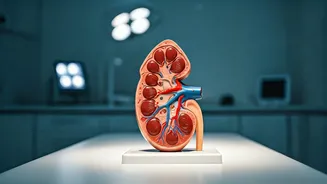Excessive Caffeine Intake
Starting the day with multiple cups of coffee or other caffeinated beverages might seem harmless, but excessive caffeine consumption can strain the kidneys.
Caffeine acts as a diuretic, increasing urine production and potentially leading to dehydration, especially if fluid intake isn't adequate. Over time, chronic dehydration can lead to kidney problems. Also, caffeine can elevate blood pressure, putting additional stress on the kidneys. Moderation is key. Instead of reaching for a second or third cup, consider alternative beverages like herbal teas or simply water to stay hydrated. Being mindful of your caffeine intake can significantly improve your kidney health and prevent further complications. If you have kidney problems or concerns, it's very important to ask your doctor to know the safe amount of caffeine consumption.
Ignoring the Urge
Holding urine for extended periods, particularly in the morning when you may be rushing, can be dangerous. Ignoring the body's signals to urinate can cause urine to build up, creating pressure in the bladder and kidneys. This pressure can contribute to kidney infections and potentially, chronic kidney disease. This is because urine can back up into the kidneys. It's a simple change to incorporate into your morning routine: when you feel the urge, do not delay visiting the toilet. Regular and timely urination is crucial for preventing infection and maintaining kidney health. Furthermore, delaying urination can weaken the bladder muscles, making it harder to empty the bladder completely and potentially leading to incontinence later in life. Always heed your body's signals and prioritize frequent bathroom breaks.
Overdoing Painkillers
Many people reach for over-the-counter painkillers like ibuprofen or naproxen for morning aches or headaches. However, regular use of these nonsteroidal anti-inflammatory drugs (NSAIDs) can be hard on the kidneys. NSAIDs reduce blood flow to the kidneys, impacting their ability to function. They can cause kidney damage, especially in people who already have kidney disease. Moreover, prolonged usage may contribute to chronic kidney conditions. If you experience persistent pain, avoid using NSAIDs as a first solution and seek medical advice instead. Always follow the prescribed dosage and avoid taking them for long durations unless advised by a healthcare provider. There are several alternative approaches to managing pain such as yoga and meditation.
Skipping Breakfast
Breakfast is often considered the most important meal of the day, and skipping it can affect kidney health, too. Skipping breakfast can lead to increased blood sugar levels, especially for those with diabetes or pre-diabetes, which directly impacts the kidneys. High blood sugar can damage the blood vessels in the kidneys, decreasing their ability to filter waste properly. Also, not eating breakfast may result in dehydration, since you are not consuming any liquids. You should eat a balanced breakfast that incorporates fluids to begin your day with healthy hydration. Making breakfast a priority, especially a kidney-friendly one, is vital for supporting overall health and kidney function, thus avoiding potential future complications.
High-Sodium Breakfasts
Many popular breakfast choices are high in sodium, for example, processed cereals, breakfast meats like bacon and sausages, and certain types of bread. A high-sodium diet can increase blood pressure, which, as previously mentioned, puts extra stress on the kidneys. Moreover, it can cause the body to retain more water, exacerbating this problem and worsening any existing kidney issues. Making conscious food choices by carefully reading labels and picking low-sodium options can significantly benefit your kidneys. This includes opting for fresh, whole foods. Reducing the salt intake in your morning meal can greatly benefit your kidney health and helps you start the day with a focus on your well-being. Replace salty breakfast options with healthier ones to start your day better.



















